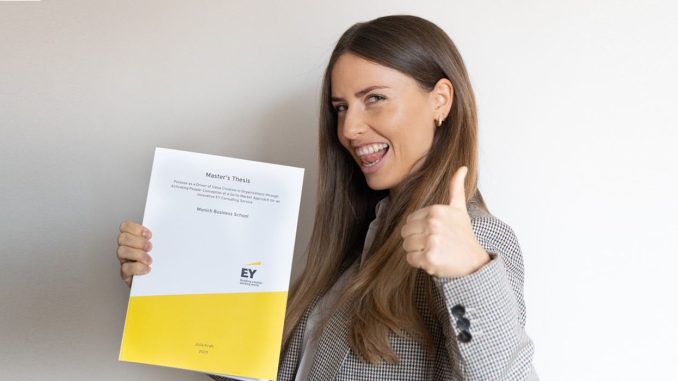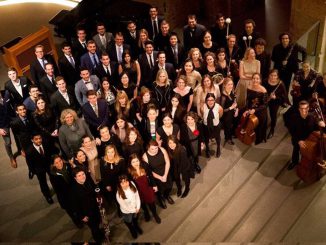
Students often perceive their bachelor’s or master’s thesis only as an annoying and labor-intensive accessory that is needed to successfully complete their studies. The experience of MBS graduate Julia Kraft shows that this does not have to be the case, but that, on the contrary, you can use your thesis for yourself and your career goals. Read for yourself!
A Promising Start
The children’s rights and world renown activist Malala Yousafzai once stated: “It is very important to know who you are. To make decisions. To show who you are.” As many students during their studies are faced with decisions, MBS ones have to decide whether to write their thesis at Munich Business School or collaborating with a company. Julia Kraft, MBS alumna in the master’s program International Business, has also addressed this question and chosen to write her thesis in collaboration with Ernst & Young (EY). Not knowing by then, how her personality guided her decision, led to great opportunities and emphasized who she is and how she would infuse the world with purpose.
Setting the Stage
Taking the opportunity to gain practical experience during the research work was a decisive criterion for Julia to write her master’s thesis in collaboration with a company. Since this requires good and timely planning, she started early to look for a position and a research topic that met her interest field. Pursuing her goal of working in management consulting, Julia was eventually hired as a working student within EY’s People Advisory Services (PAS) in Munich. As part of the Strategic Enablement Office, which is the direct support to GSA PAS’ regional leader, Julia worked on strategic topics aiming at elevating the departments maturity, diversifying its portfolio and unlocking human potential. A client facing approach toward “purpose” was one of these growth topics. After consulting with her supervisors Carina Boateng from EY and Prof. Dr. Hans Jung from MBS, Julia decided to focus her research on the topic of purpose activation. Choosing a topic of high relevance for EY and its clients provided the opportunity to make a personal contribution to driving cultural transformation, value creation, and ultimately a better working world.
Purpose on Point
Organizations today face an accelerated pace of change that reshapes their business environment. Digitalization, a war for talent, generation and value shifts, changing customer behavior, and environmental issues are only a few examples of disruptions organizations are confronted with. Along with the COVID-19 crisis, all these factors are currently driving the debate on purpose, and thus, the pursuit of resilience as one positively impacted aspect. As a result, many businesses are concerned with much more than just visions and missions. Purpose is, therefore, no longer a buzzword but a necessity that organizations must deal with. A compelling purpose is about making a positive impact in the world and creating long-term value to stakeholders beyond profit. It is the new source of motivation that can serve as a compass for both leaders and employees to successfully navigate through times of accelerated change.
Being a purpose-led company, EY wanted to offer its clients in Germany, Switzerland, and Austria an innovative consulting service that closes the gap of perceived significance and a purpose that is actually realized. Therefore, Julia’s master’s thesis aimed to conceptualize an innovative EY consulting service and a go-to-market approach for purpose activation.
Research and Conceptualization Phase
During the research, Julia had the opportunity to receive academic support from Prof. Dr. Hans Jung and business-related support from Carina Boateng. Regular communication helped her to reflect both viewpoints in the conception of the new consulting service. Particularly advantageous was the access to EY-internal databases, which also provided useful sources in addition to the MBS databases. The close cooperation with the team and the exchange with colleagues across the globe allowed Julia to gather new perspectives and ideas for her master’s thesis and experience the EY corporate culture at first hand. Furthermore, access to the company-wide network enabled Julia to conduct interviews, as part of the qualitative research, with key stakeholders.
After the Thesis: Julia Kraft’s Role Change to a Consultant
With the successful completion of her master’s thesis and the deliverables for purpose activation, new possibilities opened up for Julia. Since October 2020, Julia has become part of the EY family, where she continues to work together with Carina on exciting projects around the topics of people and work. The focus of her work is currently on the roll-out of purpose activation as a consulting service. In a pilot project, she has the opportunity to put the theoretical knowledge from her research project into practice and apply it directly with the client.
From research to delivery, this development reinforces the initial decision to write a thesis collaboratively with a company and the feeling of having made a valuable contribution and driving cultural change.
What Can MBS Graduates Learn From Julia Kraft’s Success Story?
For learning from best practices, Julia’s success story provides vital take-aways. To succeed, it is important to create an opportunity:
- Get off the beaten track and choose a future-relevant topic for your final thesis, for which you have a very high personal motivation.
- Create the opportunity to work on this topic in an environment with professional companies at an early stage; the learning success will certainly be greater as a result.
- Find the right focus to be able to successfully complete the topic conceptually and methodologically within the set time frame.
- Use the project management and change communication skills acquired at MBS to involve all key stakeholders alongside your academic journey.
- Have the courage to grow on your assignment: innovating a service offering for a global consulting firm is a challenge. Mastering it very successfully fosters confidence in one’s own abilities and sets a perfect starting point for a professional career.
The authors are responsible for the content and form of the article.

After completing your bachelor’s degree, you would like to delve even deeper into the processes of international business administration and specialize in a particular area, such as finance, marketing, or sports business?
Then you will find a broad selection of business master’s programs with different focuses at Munich Business School. In all programs, you’ll benefit from small classes, lecturers from the business world, and outcome-focussed learning that makes it easy to start your career. See for yourself:
Master’s in International Business
Master’s in International Business I Finance
Master’s in Innovation and Entrepreneurship
Master’s in International Marketing and Brand Management
Master’s in Sports Business and Communication





